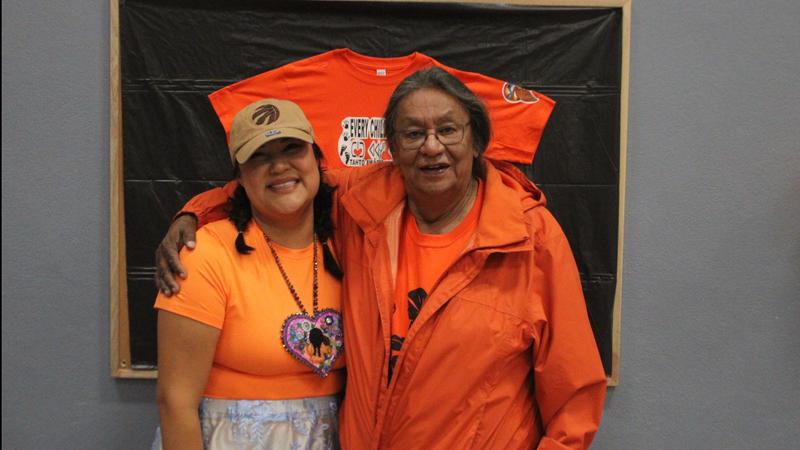Top Stories
Survivors Share Stories of Healing at Prince Albert Event

More than 200 people gathered at the Prince Albert Grand Council (PAGC) Cultural Centre on March 12, 2024, to honor the resilience of former residential school students, both those who survived and those who did not return home. The event served as a platform for sharing personal experiences of trauma and healing, particularly in the context of intergenerational impacts stemming from Canada’s residential school system.
George Merasty, who attended the All Saints Residential School at just six years old, reflected on his traumatic experiences. “I was never the same little boy that I was before I came to residential school. Everything shut down because of the straps, the abuse that happened,” he stated, visibly emotional as he shared his story. Merasty emphasized the importance of the gathering, noting that every attendee has a connection to the residential school legacy, whether they realize it or not.
One poignant moment during the event came from Merasty’s daughter, Wendy Merasty, who spoke candidly about her upbringing in a household affected by alcohol abuse. She recalled a significant moment in her life when her father hugged her after she graduated high school. “When he hugged me, it felt like a blanket… we shared that moment together that nobody could take away,” she said. Wendy, now pursuing a PhD in Education, aims to create parenting programs for Indigenous mothers, highlighting her commitment to fostering a healthier family environment for future generations.
The event also featured Shirley Woods, the Health Director for PAGC, who shared her mother’s experience at a residential school in Duck Lake. She revealed the identification numbers assigned to her family members at the school, stating, “My mom’s number was 383; my grandmother’s was 198; and my grandfather’s was 91.” Woods discussed her mother’s resilience, recalling that despite the trauma she faced, she was determined not to let it define her life or her role as a parent. “She rarely spoke at that time about residential school,” Woods said, illustrating the long-lasting effects of such experiences on individual lives.
During the event, PAGC Grand Chief Brian Hardlotte addressed the ongoing need for governmental action regarding reconciliation efforts. He referenced a recent announcement by Premier Scott Moe concerning compensation for former students at Île-à-la-Crosse, advocating for similar measures for Timber Bay. “It would be the right thing to do,” he asserted.
Prince Albert Mayor Bill Powalinsky underscored the need for self-reflection among community members. “Truth and reconciliation starts inside of us,” he remarked, emphasizing the importance of reconciling biases and ignorance about the historical injustices faced by Indigenous peoples.
The event also included representatives from local law enforcement. P.A. Police Chief Patrick Nogier stated that sincerity and acknowledgment are critical in the reconciliation process. He committed to fostering genuine relationships within the community and emphasized the need to recognize the historical injustices that have led to trauma and conflict.
Through personal stories and shared experiences, the gathering at the PAGC Cultural Centre highlighted the ongoing journey of healing and the importance of communal support in addressing the lasting impacts of residential schools in Canada.
-

 Education3 months ago
Education3 months agoBrandon University’s Failed $5 Million Project Sparks Oversight Review
-

 Science4 months ago
Science4 months agoMicrosoft Confirms U.S. Law Overrules Canadian Data Sovereignty
-

 Lifestyle3 months ago
Lifestyle3 months agoWinnipeg Celebrates Culinary Creativity During Le Burger Week 2025
-

 Health4 months ago
Health4 months agoMontreal’s Groupe Marcelle Leads Canadian Cosmetic Industry Growth
-

 Technology3 months ago
Technology3 months agoDragon Ball: Sparking! Zero Launching on Switch and Switch 2 This November
-

 Science4 months ago
Science4 months agoTech Innovator Amandipp Singh Transforms Hiring for Disabled
-

 Education3 months ago
Education3 months agoRed River College Launches New Programs to Address Industry Needs
-

 Technology4 months ago
Technology4 months agoGoogle Pixel 10 Pro Fold Specs Unveiled Ahead of Launch
-

 Business3 months ago
Business3 months agoRocket Lab Reports Strong Q2 2025 Revenue Growth and Future Plans
-

 Technology2 months ago
Technology2 months agoDiscord Faces Serious Security Breach Affecting Millions
-

 Education3 months ago
Education3 months agoAlberta Teachers’ Strike: Potential Impacts on Students and Families
-

 Science3 months ago
Science3 months agoChina’s Wukong Spacesuit Sets New Standard for AI in Space
-

 Education3 months ago
Education3 months agoNew SĆIȺNEW̱ SṮEȽIṮḴEȽ Elementary Opens in Langford for 2025/2026 Year
-

 Business4 months ago
Business4 months agoNew Estimates Reveal ChatGPT-5 Energy Use Could Soar
-

 Technology4 months ago
Technology4 months agoWorld of Warcraft Players Buzz Over 19-Quest Bee Challenge
-

 Business3 months ago
Business3 months agoDawson City Residents Rally Around Buy Canadian Movement
-

 Technology2 months ago
Technology2 months agoHuawei MatePad 12X Redefines Tablet Experience for Professionals
-

 Business3 months ago
Business3 months agoBNA Brewing to Open New Bowling Alley in Downtown Penticton
-

 Technology4 months ago
Technology4 months agoFuture Entertainment Launches DDoD with Gameplay Trailer Showcase
-

 Technology4 months ago
Technology4 months agoGlobal Launch of Ragnarok M: Classic Set for September 3, 2025
-

 Technology4 months ago
Technology4 months agoInnovative 140W GaN Travel Adapter Combines Power and Convenience
-

 Science4 months ago
Science4 months agoXi Labs Innovates with New AI Operating System Set for 2025 Launch
-

 Top Stories2 months ago
Top Stories2 months agoBlue Jays Shift José Berríos to Bullpen Ahead of Playoffs
-

 Technology4 months ago
Technology4 months agoNew IDR01 Smart Ring Offers Advanced Sports Tracking for $169










